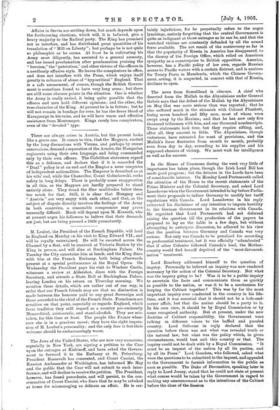The Jews of the United States, who are now very
numerous, especially in New York, are signing a petition to the Czar upon the outrages at Kishineff, and have asked the Govern- ment to forward it to the Embassy at St. Petersburg. President Roosevelt has consented, and Count Cassini, the Russian Ambassador at Washington, has informed Mr. Hay and the public that the Czar will not submit to such inter- ference, and will decline to receive the petition. The President, however, has found precedents, and will persist, to the con- sternation of Count Cassini, who fears that he may be rebuked at home for mismanaging so delicate an affair. He is cer-
tainly injudicious, for he perpetually refers to the negro lynchings, entirely forgetting that the central Government is quite as indignant at those outrages as he can be, and that the wretched victims are constantly defended by all the armed force available. The net result of the controversy so far is that the popularity of Russia in America has disappeared, to the dismay of the Foreign Office, which relied on American sympathy as a counterpoise to British opposition. America, however, has a Pacific policy of her own, regards Russian access to Pacific waters with a certain distrust, and is anxious for Treaty Ports in Manchuria, which the Chinese Govern- ment, acting, it is suspected, in concert with that of Russia, declines to open.










































 Previous page
Previous page